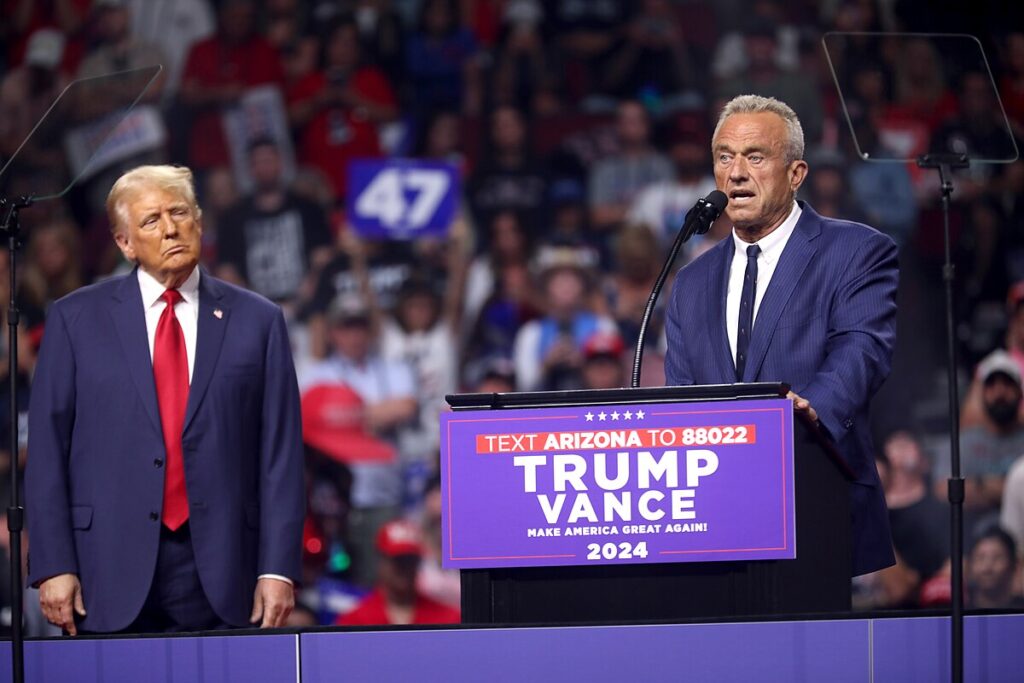Abortion
What should pro-lifers think of Trump’s cabinet picks?
President-elect Donald Trump’s cabinet picks continue to be a source of obsessive interest for the chattering classes, politicos, and, of course, pro-lifers. Personnel, as they say, is policy, and the pro-life movement benefited enormously from pro-life appointments in Trump’s first administration. His choices thus far have been a mixed bag.
One of his most recent picks is Dr. Janette Nesheiwat, a Fox News medical contributor, for U.S. Surgeon General. “Dr. Nesheiwat is a fierce advocate and strong communicator for preventative medicine and public health,” Trump stated in announcing the selection. “She is committed to ensuring that Americans have access to affordable, quality healthcare, and believes in empowering individuals to take charge of their health to live longer, healthier lives.”
Nesheiwat’s professional credentials are impressive — she did her medical residency at University of Arkansas Medical Center in Fayetteville, completed ER rotations at Johns Hopkins University, and currently serves as Medical Director at CityMD. She identifies as a Christian, and her book Beyond the Stethoscope: Miracles in Medicine emphasizes the “transformative power of prayer.” Her views on abortion, however, are in question.
In 2019, when Alabama passed a bill outlawing abortion with an exception for “serious health risks” to the mother, Nesheiwat condemned the law in language cribbed directly from the Planned Parenthood playbook on Fox News:
“As a doctor, I’m concerned for safety,” she stated. “I’m concerned — are we going to see an uprise in back-alley abortions? Am I going to see young teenagers trying to involuntarily trying to hurt themselves by trying to self-abort their fetuses out of fear and not knowing what to do and not having alternatives?”
While Nesheiwat appears to have flip-flopped in how she speaks about abortion over the years, the best litmus test for determining one’s actual convictions is the position they take when it is difficult to do so. When she had the opportunity to defend laws protecting pre-born children in the womb, Nesheiwat not only declined to do so — she even avoided referring to pre-born children as children or babies, instead opting to refer to “fetuses,” a scientifically accurate term that is generally used to dehumanize the pre-born.
It is also notable that her “concern” was not for the babies being brutally killed in the womb but instead about “back-alley abortions” — although I haven’t been able to find any comments from Nesheiwat condemning the abortion industry’s campaign to mainstream the use of abortion pills outside of the medical context (I’d be pleased to be proven wrong on this). Nesheiwat also praised Trump’s defense of abortion pills in June. Nesheiwat is asserting here that when a woman is pregnant, medical professionals are dealing with one patient rather than two. This is a dead giveaway.
The ongoing cabinet selection process reveals that the pro-life movement’s concerns are, for the most part, becoming simply irrelevant. Trump promised that his first administration would be pro-life, and he delivered. He has promised that his second administration will not be — the only abortion-related promise he has made is that he will veto any federal abortion ban that crosses his desk — and his choices reflect that reality. Some pro-lifers have been chosen thus far, as it would be difficult, in the conservative movement, to avoid doing so. But those choices do not appear to be a deliberate attempt to reward a coalition partner.
This is not to say that there are not ways for the political arm of the pro-life movement to influence Trump’s selections, especially because a number of his nominees face uphill confirmation battles in the Senate. As Politico reported on November 20: “Anti-abortion groups have 2 asks. RFK Jr. is listening.” From the report:
Robert F. Kennedy Jr. is on a mission to win over skeptical anti-abortion groups and their allies on Capitol Hill. It could make or break whether the soon-to-be GOP-controlled Senate confirms him to serve as President-elect Donald Trump’s Health and Human Services secretary. Abortion opponents — concerned about Kennedy’s past comments supporting abortion access — have two major asks: that he appoint an anti-abortion stalwart to a senior position in HHS and that he promise privately to them and publicly during his confirmation hearing to restore anti-abortion policies from the first Trump administration, according to four anti-abortion advocates granted anonymity to discuss private conversations. And Kennedy, according to a fifth person close to the Trump transition, is open to their entreaties.
These negotiations, according to Politico, “come amid growing recognition from Kennedy’s inner circle and the broader Trump transition team that he needs to appease anti-abortion groups and those alarmed by his views on vaccines to secure the 50 votes needed for Senate confirmation. Trump’s health secretary will play a key role in shaping abortion access, including through access to abortion pills, making the decision pivotal to anti-abortion advocates.” Kennedy has “little personal interest in abortion policies,” and thus may be open to “putting someone alongside him who does.”
Confirmation hearings will also present an opportunity for pro-life legislators to push Trump’s cabinet on the issue. Senator James Lankford told Politico that he plans to do just that. “I have a lot of life questions,” Lankford said. “I want to know if the second Trump administration will have the same life perspective at HHS that the first one did. … They were very, very good about all the different issues.” The Biden-Harris administration implemented many pro-abortion policies, and pro-life groups want the Trump administration to repeal them:
At a minimum, anti-abortion groups want to see the Trump administration rescind the policies Biden implemented that expanded abortion access, such as the update to HIPAA privacy rules to cover abortions, as well as FDA rules making abortion pills available by mail and at retail pharmacies.
“We eagerly anticipate the day when the abortion pill is recognized for the evil it is and prohibited, and we encourage the President-elect to, at a minimum, swiftly reverse these changes made by the Biden administration,” Brent Leatherwood, president of the Ethics and Religious Liberty Commission, the political arm of the Southern Baptist Convention, wrote in a recent memo to the Trump transition team outlining several of those policy priorities.
The pro-life movement is in new political territory. For the first time, the Republican president-elect is openly pro-choice and has vociferously opposed protections for pre-born children early in pregnancy. With a Kamala Harris administration, however, there would be no open doors. With a second Trump administration, there is still opportunities for leverage and for pro-life policies. Pro-lifers must keep up the pressure.








